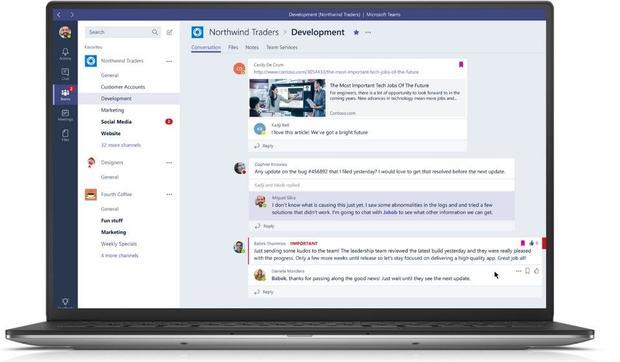During its Ignite conference today, Microsoft said Teams will be getting a set of new communication features for voice and video calls. Previously, this was Skype for Business’ territory, an app built specifically to bring Skype’s calling functionality into the workplace.
Since the launch of Teams, it’s been received well and over 125,000 organisations are now using it. Microsoft’s now planning to focus its efforts on the app, building a single platform for businesses to collaborate on. The company confirmed Teams will become its “hero and primary experience” and its “core communications client” for Office 365. Skype for Business will eventually be replaced.
Microsoft said the decision has been made based on the newer infrastructure available in Teams. The company said it’s got more opportunities to increase its “speed of innovation” by concentrating on its brand-new platform.
The move also gives it the unstated benefit of being able to focus on a new and relatively popular app. In recent years, Skype for Business has been overshadowed by rapidly growing alternatives, including primarily chat-based solutions like Slack.
READ NEXT: Bing for Business helps companies make sense of their data
Teams is really a response to an industry trend, representing Microsoft’s attempt to get itself back in the enterprise chat room. The current reality is that Skype for Business is aging and no longer reflective of the state of the market. The role of Teams as its replacement isn’t likely to have been accidental.
“Microsoft Teams is core to our vision for intelligent communication – bringing together conversations, meetings, files, Office apps, and third-party integrations – to provide a single hub for teamwork in Office 365,” said Microsoft. “To achieve our vision for intelligent communications, we are bringing comprehensive calling and meetings capabilities into Teams, along with data and insights from the Microsoft Graph, and a strong roadmap of innovation to empower teams to achieve more.”
Microsoft also outlined its vision for the future of online business meetings. It said entire discussions could be completed in Teams, with the app presenting relevant documents before the event, capturing audio during the talk and then automatically transcribing and uploading notes after the meeting is over. Teams is evolving into a complete end-to-end collaboration experience in a way Skype for Business never could.
From today, Teams supports audio conferencing, interoperability with Skype for Business, scheduled meetings and “enterprise-grade” voice and video calls. Microsoft said many more feature releases are planned for the coming months as it dedicates additional resources to its “intelligent communications” team, a buzzword meant to show it’s returning to modern business collaboration tech.














